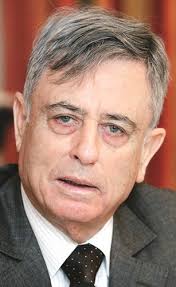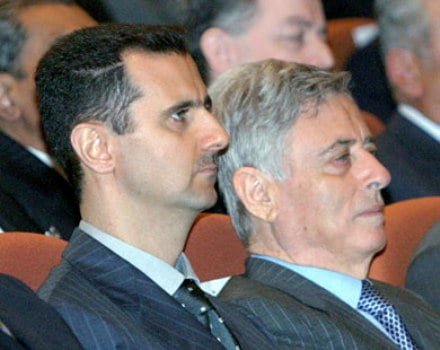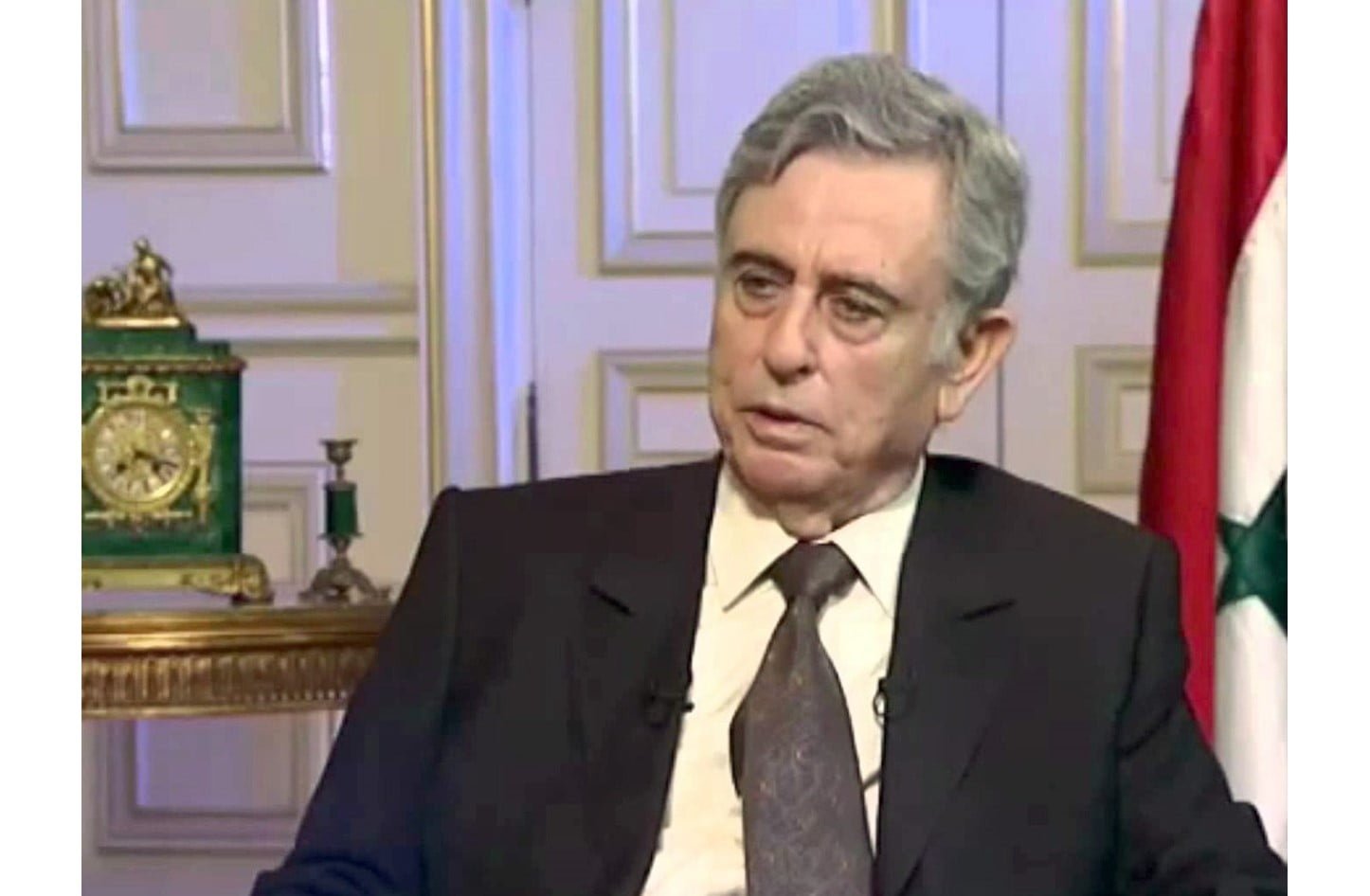The former Syrian Vice President, Abdel Halim Khaddam, has made surprising statements that have caught many off guard. He discusses his disagreements with former Syrian President Hafez al-Assad and distances himself from the internal mistakes made during his time in charge of politics. Khaddam specifically mentions the incidents involving Yasser Arafat’s expulsion from Syria in 1983, the assassination attempt on him by the Fatah movement in 1977 under orders from Iraqi intelligence, and the order to assassinate Rafiq Hariri given by Bashar Al-Assad.
The resigned Syrian Vice President, Abdel Halim Khaddam, has made surprising statements that have left many astonished. He discusses his differences with former Syrian President Hafez al-Assad and distances himself from his own internal mistakes, emphasizing that he was specifically in charge of foreign policy. Khaddam highlights that the Baath Party, which has been associated with the Assad family’s rule since 1970, has no involvement in the policies of either Assad, father or son. He asserts that it is the Assad family itself that has propagated sectarianism and instilled fear among the Alawite community.
Khaddam clarifies that he had no role in the expulsion of the late Palestinian President Yasser Arafat from Syrian territory in 1983, as it was ordered by the Syrian President Assad, the father, and carried out by the military police. He also confirms that the assassination attempt he faced in 1977 was orchestrated by the Fatah organization, specifically the Revolutionary Council led by Sabri al-Banna, known as “Abu Nidal.” According to him, this assassination attempt was requested by the Iraqi intelligence services. He further states that another assassination attempt in the mid-eighties was carried out by a Syrian security service.
Khaddam denies any financial relations with the Hariri family and asserts that he sustains his livelihood from his own accumulated funds over the past fifty years. He concludes by asserting that Bashar al-Assad’s regime is headed towards collapse and emphasizes that he had no involvement in internal Syrian politics. Therefore, he suggests that anyone with a case against him should seek legal recourse through the judiciary. This intriguing dialogue provides insights into Khaddam’s perspective on various internal and international matters.
How does it feel to be out of power after living in it for decades?
Abdel Halim Khaddam: What has always mattered to me is the country’s interests, whether I am in a position of authority or not. Power, for me, was a tool to serve my country, and I did everything I could when I was in charge of foreign policy. Now that I am out of power, my focus is on saving Syria and alleviating the suffering of the Syrian people.
- Do you now have a clear understanding of the hardships faced by Syrians who have been living away from their homeland for decades?
Abdel Halim Khaddam: Not just now, but a long time ago. During my tenure as Minister of Foreign Affairs, I met numerous displaced Syrians living in exile, and I witnessed their suffering. While we have been successful in facilitating the return of some, there have been challenges with others due to decisions made by various parties within the country. It is only natural that being away from home and feeling alienated causes immense distress. Therefore, one of the key objectives of the National Salvation Front in Syria is to remove any barriers preventing the return of expatriates and to encourage their repatriation because the country needs them.
- You were instrumental in bringing Bashar al-Assad to power. Why did you do that?
Abdel Halim Khaddam: I was not the one who brought Bashar al-Assad to power; it was his father who orchestrated all the necessary party, security, and military measures and procedures to ensure his ascension.
You brought him to power, and now you are criticizing him. Can change actually happen in Syria when you are familiar with the intricacies of building the regime since you contributed to its construction?
Abdel Halim Khaddam: I have been critical of the regime since the time of President Hafez al-Assad. My criticism of his successor is rooted in the significant mistakes I see, such as the pursuit of power isolation, suppression of public and individual freedoms, contribution to corruption, and the confusion in economic, administrative, and foreign policies that led to Syria’s isolation in the Arab region. Change in Syria will come from within, and the role of Syrians abroad is to participate and support the process of change and its progress.
How can a regime that relies on security, torture, arrests, and other sophisticated methods against humanity be overthrown?
Abdel Halim Khaddam: If it were merely about security and torture, humanity would not have progressed from slavery to freedom. Regardless of how powerful the security apparatus may be, the power of the people surpasses it. The regime in Romania was even more oppressive, yet the people managed to topple it. I assure you that the regime is heading towards disintegration and collapse.
- How did you come to the decision to leave the regime, despite being one of its creators?
Abdel Halim Khaddam: Several years before my resignation, I made the decision to leave the regime because all my attempts to bring about political, economic, and administrative reforms had failed. I believed that Bashar Al-Assad was leading the country towards isolation and destruction, so I planned my exit in a calm manner.
- Is your departure due to the influence of one of your former employees, Farooq Al Shara, who has become a significant figure within the system?
Abdel Halim Khaddam: The issue is not solely about Farooq Al Shara; it is a problem with the system itself. The gap between me and this system has widened due to the severity of its actions.
In one of your interviews, you mentioned that resigning under Hafez al-Assad’s rule would lead to death or imprisonment. Does this imply that you attempted to resign indirectly but eventually backed down due to the inevitable consequences?
Abdel Halim Khaddam: During President Hafez al-Assad’s reign, I held responsibility for foreign policy until late 1998. While we agreed on our foundations and practices in Arab and international foreign policy, we had disagreements regarding the internal situation. I had contemplated resigning, but I did not make a definitive decision for various reasons, including external circumstances that Syria was experiencing, as well as the nature and procedures of the system.
- How would you describe the era when Hafez al-Assad ruled Syria?
Abdel Halim Khaddam: The era of Hafez al-Assad’s rule had two aspects. Internally, it was met with rejection by the majority of the Syrian people due to the consolidation of power, repressive practices, killings, displacements affecting tens of thousands of Syrians, and the rampant corruption. Externally, it granted Syria a significant weight in the Arab and international arenas.
- Don’t you believe that the ruling minority in Syria is utilizing the Baath Party to advance its political agenda?
Abdel Halim Khaddam: The governing authority in Syria lies with the Hafez al-Assad family. The Baath Party is among the victims of the regime, having no role in managing the country or wielding power. It is marginalized.
- Do you think that certain individuals have perpetuated sectarianism in Syria, similar to what occurred in Iraq?
Abdel Halim Khaddam: The regime attempted to incite sectarianism by sending delegates to the coastal regions and spreading the narrative that the proposed changes were targeting the Alawite community. However, the vast majority rejected this reasoning due to the crimes committed by the ruling family in those regions.
- What did you discuss with Sadruddin Bayanouni, the leader of the Muslim movement, when you met him in Belgium?
Abdel Halim Khaddam: We discussed the situation in Syria and reached an agreement to form an alliance aimed at saving Syria. Our goal was to overthrow the regime and establish a democratic system and a civil state based on the principles of free elections.
- If you were to return to Syria, would you apologize to the Syrian people for the massacres in Hama, Palmyra, and other places?
Abdel Halim Khaddam: I had no involvement in any of the internal events and circumstances that took place. I became aware of the details later on. The party leadership had no role in these events, so I have no reason to apologize. If anyone has a complaint against me or others, I encourage them to seek justice through the appropriate legal channels.
- Why did one of the Palestinian organizations attempt to assassinate you in Syria during the mid-1980s?
Abdel Halim Khaddam: It was not a Palestinian organization that attempted to assassinate me in the mid-1980s. The attempt was carried out by a security branch associated with one of the Syrian military formations. However, in October 1977, the Palestinian organization Fatah Al-Thawra (Fatah Organization – Revolutionary Council) tried to assassinate me at Abu Dhabi airport with the help of Iraqi intelligence.
- Is it true that you were responsible for the expulsion of the late Palestinian President Yasser Arafat from Syria in the early 1980s?
Abdel Halim Khaddam: That is not true. As far as I know, Arafat was expelled due to a press conference he held in Damascus, during which he criticized the Syrian leadership and praised General Rifaat Al-Assad. This created a crisis between him and the leadership. President Hafez Al-Assad made the decision to expel him and instructed the military police to carry it out.
What is your message to the Syrian opposition in Algeria, led by Ibrahim Makhos, the former Syrian Minister of Foreign Affairs who was imprisoned in Syria?
Abdel Halim Khaddam: I convey to the Syrian opposition in Algeria and abroad the same message as the National Salvation Front, which called for cooperation among all opposition forces to save Syria.
- You previously spoke on the Al-Mustaqbal satellite channel. As someone who had control over the Lebanese file and handed it over to Bashar Al-Assad in the 1990s, is this file the reason behind your personal conflict with Assad the son?
Abdel Halim Khaddam: That is not the case for me. The issue between us revolves around Syria and the governance approach. My struggle with Bashar Al-Assad is due to his refusal to pursue political, economic, and administrative reforms.
- In your opinion, did Assad the son give the order to assassinate Rafiq Hariri?
Abdel Halim Khaddam: In my opinion, yes, Bashar Al-Assad gave the order for the assassination.
- Does Assad the son have the ability to issue orders to assassinate other parties in Lebanon?
Abdel Halim Khaddam: Whoever gave the order to assassinate the late President Hariri still possesses the capability to issue appropriate orders.
- Why do you think the Hezbollah group tore up pictures of Hariri, labeling him a traitor, and expressed support for Lahoud as the most honorable Lebanese president?
Abdel Halim Khaddam: Mr. Hassan Nasrallah, the Secretary General of Hezbollah, has praised President Rafik Hariri on several occasions, acknowledging his national positions and his role in protecting the resistance. I believe this represents the official stance. The actions of individuals, driven by specific circumstances, may differ.
Did Syria really sell Lebanon to Iran?
Abdel Halim Khaddam: Lebanon is not a commodity to be sold, but the cooperation between the Syrian regime and Iran has allowed Iran to establish a strong political and military presence in Lebanon through Hezbollah.
- How do you sustain your life in Paris, and what are your sources of income? Some claim that the Hariri family provided you with the house you live in and financially support you.
Abdel Halim Khaddam: I live in Paris using my own lawful income, which I have accumulated over the years through my work since 1951, as well as the work of my children. My youngest child has been part of the workforce for over twenty years. They have been involved in business activities in the Gulf and have had no professional connections with any government institutions, departments, or companies in Syria.
- Have you faced any harassment from French security, particularly after reports of an Interpol arrest warrant against you?
Abdel Halim Khaddam: I have not experienced any harassment because I abide by French law. The claim regarding Interpol is untrue, as Interpol’s regulations prohibit its involvement in political, military, or religious matters.
- What is your vision for the future of Syria under Assad’s leadership and beyond?
Abdel Halim Khaddam: I believe that the Syrian regime will eventually collapse by the will of God, and the Syrian people will fulfill their aspiration of building a modern democratic state.
Abdel Halim Khaddam is considered the custodian of the Syrian regime’s secrets. Former Syrian Vice President Abdel Halim Khaddam, who has been in exile in Paris since June 2005, holds valuable knowledge about the inner workings of the Baath regime in Syria. He wielded power within the regime from 1963 until his voluntary withdrawal in 2005.
Khaddam was well aware of his stance and understood the quickest routes to power, fortune, and decision-making. Thus, he was not an ordinary party member like others but an influential figure within the Baath Party, despite the authority held by Hafez al-Assad.
Renowned Lebanese thinker and current Kataib party leader, in his book “The Lost Peace,” speaks of Khaddam, stating, “Abdel Halim Khaddam is fiercely loyal to President Hafez al-Assad. He is the only person capable of defending and challenging the ideas of his president.”
However, life doesn’t always unfold as one desires. It appears that Khaddam will soon publish his memoirs, in which he is expected to make harsh statements against Hafez al-Assad. Perhaps his bitterness stems from a sense of entitlement to succeed a regime of which he was one of the creators.
Since 2000, following Hafez al-Assad’s death and the transfer of power to Bashar, Khaddam witnessed firsthand how the latter began implementing practices that pushed the country to the brink of catastrophe.
Although he didn’t openly express his bitterness, we have seen his consistent criticisms of Bashar al-Assad, claiming that he is unfit for leadership. However, is it true that Khaddam himself deserves to succeed Hafez al-Assad, who ruled Syria with force and oppression, suppressing a challenging Syrian populace? Over the course of 35 years, the regime was able to quell any desire for rebellion and change among the Syrian people, particularly after the Medina massacres that claimed the lives of around 35,000 individuals.
Abdel Halim Khaddam, who held a prominent role in foreign policy under Assad for many years, eventually decided to quietly withdraw after witnessing his friends and closest associates abandon him to seek favor with those in power.
The most significant points in Khaddam’s life can be highlighted as follows:
- He was born in the coastal city of Banias in 1932.
- Abdel Halim Khaddam comes from a Sunni Muslim family.
- He joined the Baath Party at the age of 17.
- 1951 – Attended the Syrian University in Damascus, Faculty of Law.
- 1947-1964 – Served as the Secretary of the party’s people in Banias.
- 1954-1964 – Worked as a lawyer in Banias and Latakia.
- 1964 – Appointed as the Governor of Hama.
- 1965-1969 – Served as the Governor of Quneitra.
- 1969 – 1965 – Appointed as the Governor of Damascus.
- 1969-1970 – Served as the Minister of Economy and Foreign Trade.
- 1970-1971 – Played a role as a member of the interim Qatari leadership during the (corrective) movement.
- 1970-2000 – Served as the Deputy Prime Minister and Minister of Foreign Affairs.
- 1971-2005 – Elected as a member of the Baath National leadership.( AL Qyadeh AL Qutryeh)
- 1984-2005 – Held the position of Vice President of the Republic.
- 2005 – Became a member of the Central Committee of the Baath Party.
- Upon the death of President Hafez al-Assad in 2000, Khaddam assumed the role of President of Syria for 37 days as the late First Vice President until President Bashar al-Assad took office. Khaddam continued to serve as Vice President.
- Abdel Halim Khaddam has authored several books, including “The Contemporary Arab System: Reading Reality and Examining the Future.”
- On December 6, 2005, the Kuwaiti newspaper Al-Seyassah reported that “the Syrian regime authorities have confiscated all the assets belonging to Abdel Halim Khaddam, the former Vice President of the Republic, and his children. This decision left Khaddam with no possessions in his country.” These confiscations were a result of Khaddam’s criticism of the Syrian regime.
- On July 12, 2005, Bashar Al-Assad issued a decree relieving Abdel Halim Khaddam of his positions in the Central Command of the Progressive National Front.
For reference… There is often discussion about the Corrective Movement, which refers to the coup movement led by Hafez al-Assad against his Baath party comrades. After seizing power, he imprisoned and executed his comrades. One of the most prominent figures was President Noureddine al-Atassi, who was imprisoned by Hafez al-Assad and not released despite mediation efforts by several Arab presidents, including President Shazly Ben Jadeed. Al-Atassi had participated in the Algerian revolution against French occupation and was a doctor who treated many people. Following his death, the Algerian leadership named a hospital in Bab El Oued after the late president. Many Syrian opposition members sought refuge in Algeria after the 1970 coup, including Ibrahim Makhos, who served as the Minister of Foreign Affairs under President Atasi.
M.A.
Montreal:
Mohammed Al-Lamadani




